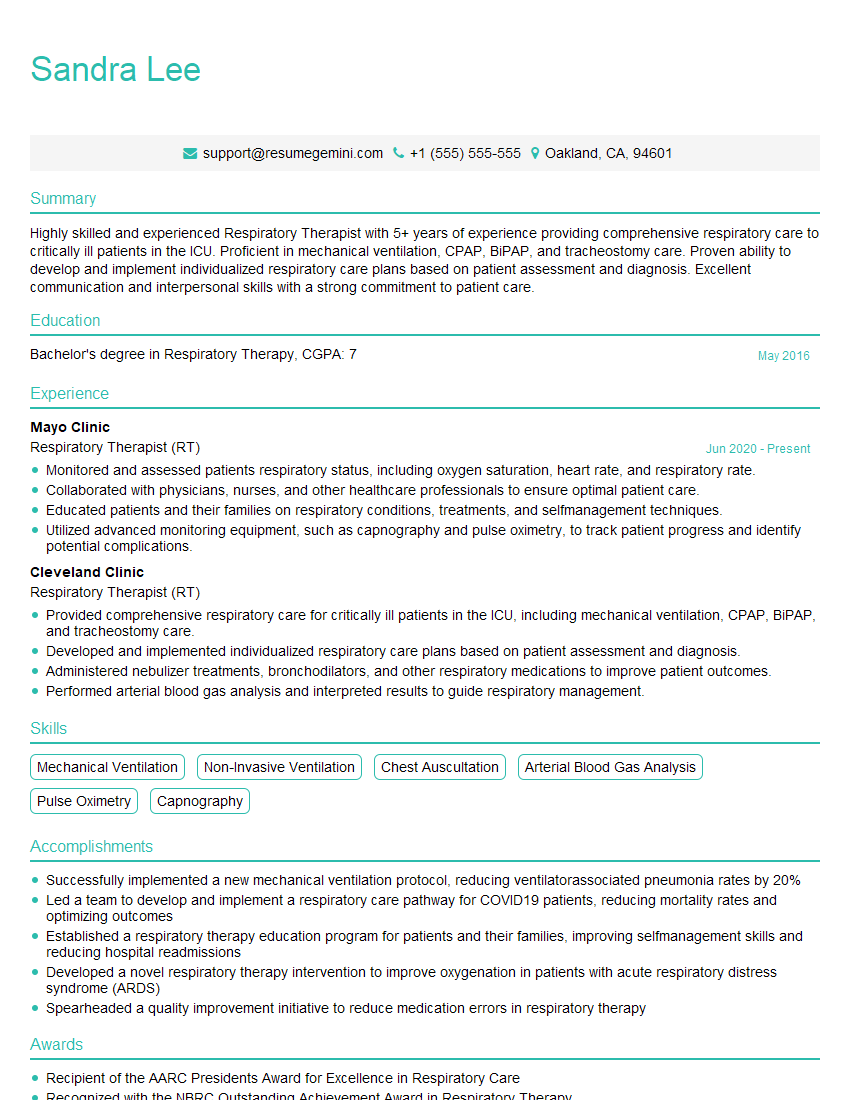Are you a seasoned Respiratory Therapist (RT) seeking a new career path? Discover our professionally built Respiratory Therapist (RT) Resume Template. This time-saving tool provides a solid foundation for your job search. Simply click “Edit Resume” to customize it with your unique experiences and achievements. Customize fonts and colors to match your personal style and increase your chances of landing your dream job. Explore more Resume Templates for additional options.

Sandra Lee
Respiratory Therapist (RT)
Summary
Highly skilled and experienced Respiratory Therapist with 5+ years of experience providing comprehensive respiratory care to critically ill patients in the ICU. Proficient in mechanical ventilation, CPAP, BiPAP, and tracheostomy care. Proven ability to develop and implement individualized respiratory care plans based on patient assessment and diagnosis. Excellent communication and interpersonal skills with a strong commitment to patient care.
Education
Bachelor’s degree in Respiratory Therapy
May 2016
Skills
- Mechanical Ventilation
- Non-Invasive Ventilation
- Chest Auscultation
- Arterial Blood Gas Analysis
- Pulse Oximetry
- Capnography
Work Experience
Respiratory Therapist (RT)
- Monitored and assessed patients respiratory status, including oxygen saturation, heart rate, and respiratory rate.
- Collaborated with physicians, nurses, and other healthcare professionals to ensure optimal patient care.
- Educated patients and their families on respiratory conditions, treatments, and selfmanagement techniques.
- Utilized advanced monitoring equipment, such as capnography and pulse oximetry, to track patient progress and identify potential complications.
Respiratory Therapist (RT)
- Provided comprehensive respiratory care for critically ill patients in the ICU, including mechanical ventilation, CPAP, BiPAP, and tracheostomy care.
- Developed and implemented individualized respiratory care plans based on patient assessment and diagnosis.
- Administered nebulizer treatments, bronchodilators, and other respiratory medications to improve patient outcomes.
- Performed arterial blood gas analysis and interpreted results to guide respiratory management.
Accomplishments
- Successfully implemented a new mechanical ventilation protocol, reducing ventilatorassociated pneumonia rates by 20%
- Led a team to develop and implement a respiratory care pathway for COVID19 patients, reducing mortality rates and optimizing outcomes
- Established a respiratory therapy education program for patients and their families, improving selfmanagement skills and reducing hospital readmissions
- Developed a novel respiratory therapy intervention to improve oxygenation in patients with acute respiratory distress syndrome (ARDS)
- Spearheaded a quality improvement initiative to reduce medication errors in respiratory therapy
Awards
- Recipient of the AARC Presidents Award for Excellence in Respiratory Care
- Recognized with the NBRC Outstanding Achievement Award in Respiratory Therapy
- Awarded the AARC National Respiratory Care Champion
- Recognized by the American Association for Respiratory Care (AARC) for exceptional contributions to the field
Certificates
- Certified Respiratory Therapist (CRT)
- Advanced Cardiovascular Life Support (ACLS)
- Pediatric Advanced Life Support (PALS)
- Neonatal Resuscitation Program (NRP)
Career Expert Tips:
- Select the ideal resume template to showcase your professional experience effectively.
- Master the art of resume writing to highlight your unique qualifications and achievements.
- Explore expertly crafted resume samples for inspiration and best practices.
- Build your best resume for free this new year with ResumeGemini. Enjoy exclusive discounts on ATS optimized resume templates.
How To Write Resume For Respiratory Therapist (RT)
Highlight your skills:
Make sure to list all of your relevant skills, such as mechanical ventilation, CPAP, BiPAP, tracheostomy care, and arterial blood gas analysis.Quantify your experience:
Use numbers to quantify your experience, such as the number of patients you have treated or the number of successful outcomes you have achieved.Tailor your resume:
Make sure to tailor your resume to each job you apply for by highlighting the skills and experience that are most relevant to the position.Proofread your resume:
Make sure to proofread your resume carefully for any errors before submitting it.
Essential Experience Highlights for a Strong Respiratory Therapist (RT) Resume
- Provided comprehensive respiratory care to critically ill patients in the ICU, including mechanical ventilation, CPAP, BiPAP, and tracheostomy care.
- Developed and implemented individualized respiratory care plans based on patient assessment and diagnosis.
- Administered nebulizer treatments, bronchodilators, and other respiratory medications to improve patient outcomes.
- Performed arterial blood gas analysis and interpreted results to guide respiratory management.
- Monitored and assessed patients respiratory status, including oxygen saturation, heart rate, and respiratory rate.
- Collaborated with physicians, nurses, and other healthcare professionals to ensure optimal patient care.
- Educated patients and their families on respiratory conditions, treatments, and selfmanagement techniques.
Frequently Asked Questions (FAQ’s) For Respiratory Therapist (RT)
What is a Respiratory Therapist?
A Respiratory Therapist is a healthcare professional who specializes in the care and treatment of patients with respiratory conditions. Respiratory Therapists provide a variety of services, including mechanical ventilation, CPAP, BiPAP, and tracheostomy care. They also perform arterial blood gas analysis and interpret results to guide respiratory management.
What are the educational requirements to become a Respiratory Therapist?
To become a Respiratory Therapist, you must have a bachelor’s degree in Respiratory Therapy from an accredited program.
What are the job prospects for Respiratory Therapists?
The job outlook for Respiratory Therapists is expected to be good over the next few years. As the population ages, the demand for respiratory care services is expected to increase.
What is the average salary for a Respiratory Therapist?
The average salary for a Respiratory Therapist is around $60,000 per year.
What are the benefits of working as a Respiratory Therapist?
There are many benefits to working as a Respiratory Therapist, including the opportunity to make a difference in the lives of patients, the chance to work in a variety of settings, and the opportunity to earn a good salary.
What are the challenges of working as a Respiratory Therapist?
There are some challenges to working as a Respiratory Therapist, including the need to work long hours, the need to be on call, and the need to deal with difficult patients.